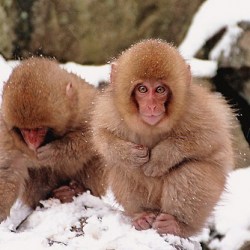Curious Monkeys Willing To Swap Prizes For Information

Monkeys are an incredibly curious species. In fact monkeys are so curious they are willing to forsake the chance to win a large potential prize just so they can find out whether they picked the winning option during a game of chance. The revelation came from the results of a recent study which showed rhesus macaques displaying a surprising desire to obtain new information, even when there was no apparent benefit from doing so.
Better understanding of humans
Researchers from the University of Rochester and Columbia University say their findings may result in an understanding of a particular region of the brain which would provide insights into human mental disorders such as addiction. As part of the study the test, monkeys were presented with a gambling task video and consistently preferred to learn in advance whether they had chosen the winning option even if this meant they would not receive their prize any quicker.
“It’s like buying a lottery ticket that you can scratch off and find out if you win immediately, or you can buy one that has a drawing after the evening news. Regardless, you won’t get the money any more quickly, or in the case of the monkeys, they won’t get the squirt of water any sooner. They will just find out if they selected the winning option.” explained Rochester cognitive science Professor Benjamin Hayden, co-senior author of the study.
Instant gratification
The test subjects not only preferred taking the gambling option that told them immediately whether they had picked the winner, but they also preferred taking that option even when the potential pay off was as much as 25 per cent less than the option that required them to wait for the outcome.
“That 25 percent was really surprising to us — that’s pretty big,” Hayden says. “These monkeys really, really want that information, and they do these gambling tasks repeatedly and never get bored of them — it’s intrinsically motivated.”
Processing new information
The results of the study will help researchers better understand how the desire for new information or curiosity is both processed and rewarded in human brains say the researchers. Just like monkeys, humans will evaluate the amount they would be willing to sacrifice in order to satisfy their curiosity Professor Hayden says.
“One of the reasons this research is important, is because this basic desire for information turns out to be something that’s really corrupted in people with anxiety, depression, obsessive-compulsive disorder, and addiction, for example. We think that by understanding these basic circuits in monkeys we may gain insights that 10 to 15 years down the road may lead to new treatments for these psychiatric diseases,” he adds.



